
In 2024, The Ultimate Guide How to Bypass Swipe Screen to Unlock on Asus ROG Phone 8 Device

The Ultimate Guide: How to Bypass Swipe Screen to Unlock on Asus ROG Phone 8 Device
Nowadays, the security mode is enabled in almost all digital devices, which is the case with our smartphones. However, when we repeatedly change our password, we might be in a state of confusion to remember it. Such instances are highly schemed to lock our messages, galleries, emails, and other personal storage. Using the locking pattern enhances security, and thus, apart from the known user of the Asus ROG Phone 8 device, unknown people cannot access your Android phone. To overcome this critical situation, we have this article to help you unlock your Android devices by removing or bypassing the swipe lock Android screen. The solutions provided in this article are easily accessible to all users and are easy to operate.
So, if you have ever been stuck due to a lock code, go through the article to resolve the issue and swipe up to unlock a password that somehow gets forgotten.
Part 1: How to disable Swipe Screen to unlock when you can access the phone?
Some people do not pay much attention to their privacy and will not bother locking their Android devices. They would disable the swipe screen to unlock their devices. Thus, this section will talk about the basic solution to disabling the swipe up to unlock Android devices. Our main focus here is on a disabling method of swiping the screen when your Android device is accessible.
Let us look at the detailed steps below to remove the swipe screen to unlock the Android phone.
Step 1: To begin with, touch the gear icon (that is setting) on the main screen of your Android phone. The settings screen will display directly since it is a shortcut to get in. You will get a drop-down menu where you will see many options are available for your flexibility.
Step 2: Out of those, choose the “Security” tab to access your further.
Step 3: It will prompt the tab as “Screen security,” You will be listed with three choices, namely, Screen lock, Lock screen options, and Owner Information.
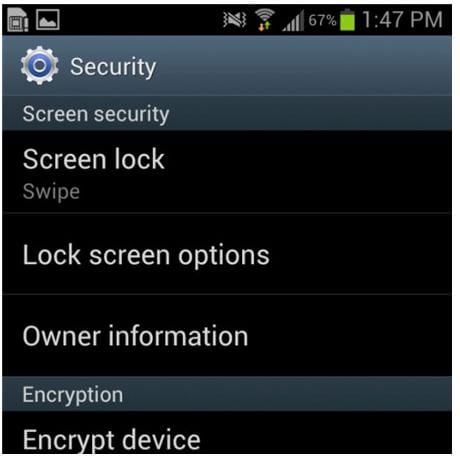
Step 4: Select the option called “Screen lock,” The next step is to enter your PIN code for security purposes. This step is carried out in Android phones to ensure you are the original owner of the Android device.
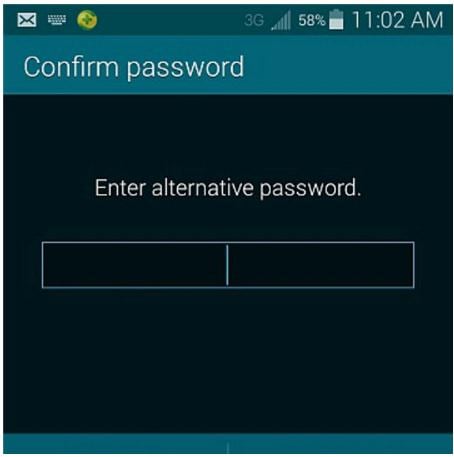
Step 5: If you click the PIN code option again, the drop-down menu will be listed with more options. Now select the option “None.”
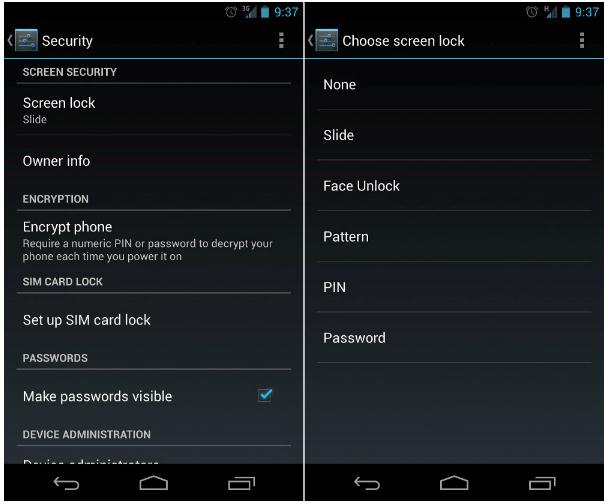
That’s all. You have successfully run out of the disable commands for the swipe up to unlock the screen. You can now open and access your device without any security methods.
Part 2:How to remove/bypass Swipe to unlock when the phone is locked?
To unlock your device, the only solution is to follow the Dr.Fone - Screen Unlock (Android) . If you are looking to unlock the screen when the phone is locked, then this method solidly proves to bypass swipe lock Android when it is locked. It helps to resolve this issue by bypassing or removing the swipe screen without causing any loss to your data. This tool temporarily supports bypassing Android screens without data loss on Samsung and LG. As for other Android phones, all the data will disappear after unlocking with this tool.
The features of this Dr.Fone software are many. It gives a solution to four lock methods: a pin, pattern, fingerprint, and password. It is user-friendly, and even a user with no technical information can also use it with no issue. This tool is only limited to remove the screen lock on Samsung and LG without losing data. Your data will still be wiped out on other Android phones after using this tool.
Dr.Fone - Screen Unlock (Android)
Remove 4 Types of Android Screen Lock without Data Loss
- It can remove four-screen lock types - pattern, PIN, password & fingerprints.
- Only remove the lock screen. No data loss at all.
- No tech knowledge asked. Everybody can handle it.
- Work for Samsung Galaxy S/Note/Tab series, and LG G2, G3, G4, etc.
4,008,669 people have downloaded it
Tips: This tool also supports unlocking other Android screens beyond Samsung and LG. However, it does not support saving all the data after unlocking, like Samsung and LG.
Step 1: Initialize the Dr.Fone on the computer, and there will be many options in front of you. In that, select the “Screen Unlock”.
Step 2: Now, to bypass swipe lock Android, using the USB cable, connect the Android device to your computer, and it will prompt the Unlock Android Screen option.
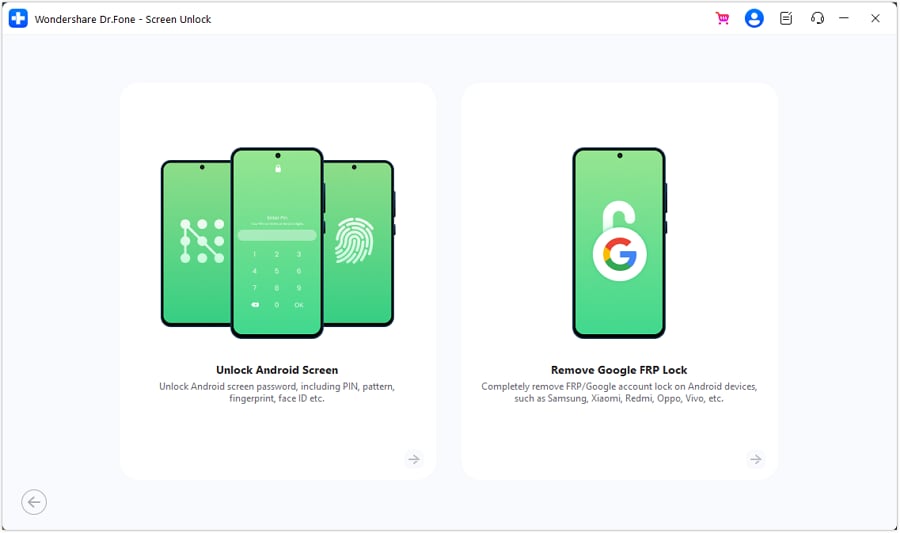
Step 3: To enable the download mode on your Android device, shut down your phone>Simultaneously, press the volume down, Home button, and Power button >Press the Volume up button. Once your device is in download mode, the recovery kit will get downloaded.
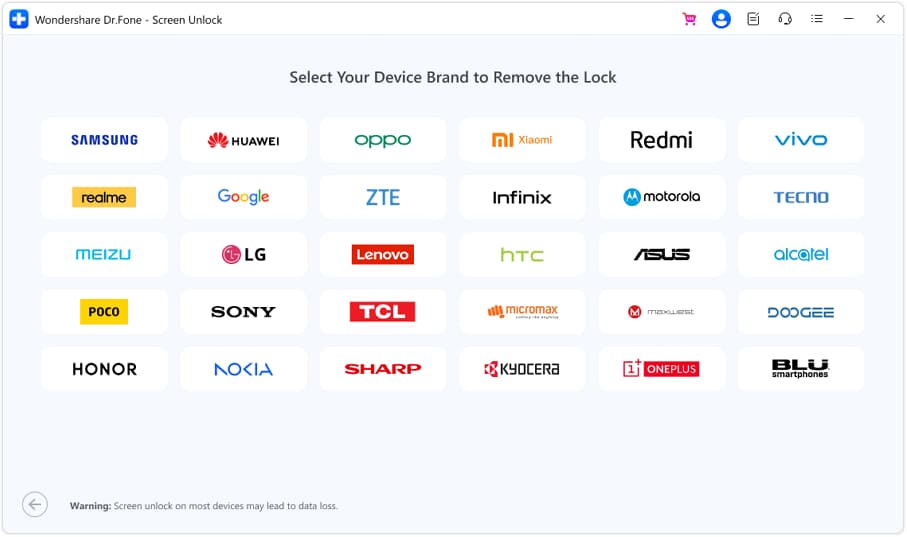
Step 4: You will see the result right in front of you as Dr.Fone - Screen Unlock, recovery will bypass swipe lock Android without hampering your data. Foremost, you can now access your device without swipe up to unlock the screen.
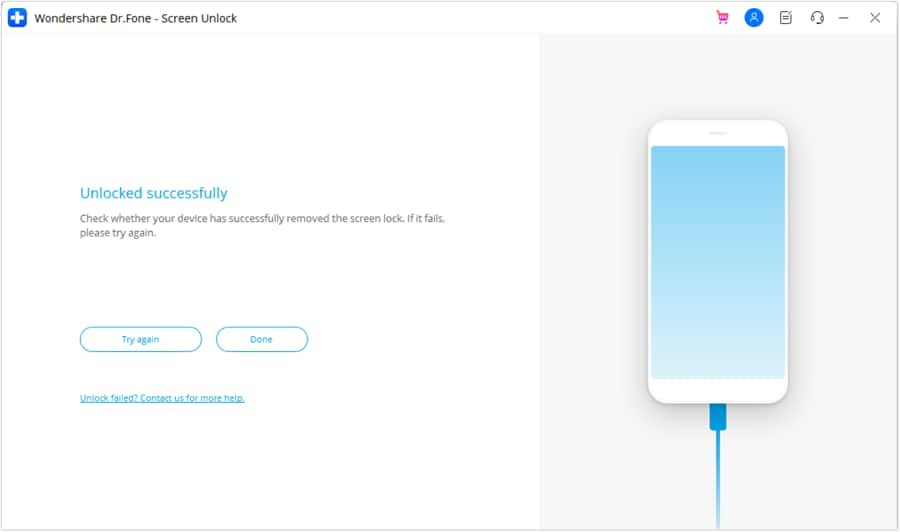
Pretty simple, right? Dr.Fone - Screen Unlock to the rescue for the issue of swipe screen to unlock.
Part 3: How to turn off the swipe to unlock when the pattern is enabled?
In this section, we will cover how to turn off the swipe to unlock when the pattern lock of the Asus ROG Phone 8 device is enabled. Therefore, here we will go through the process of turning off the swipe to unlock the feature of your device. This structure is formed in some interval of locking the screen.
The steps below imply turning off of swiping screen instantly:
Step 1: At first, open the app “Setting” present on your Android device.
Step 2: There will be multiple interfaces. Now choose the option “Security.”
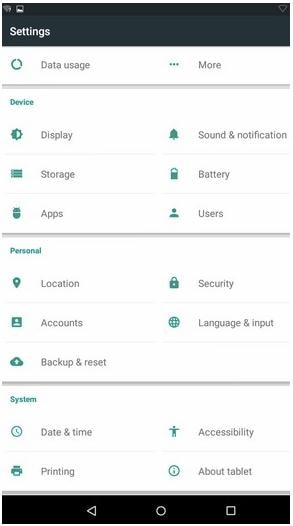
Step 3: To turn off the swipe screen, when the pattern is enabled then, choose “Screen lock” and then click on “NONE.”
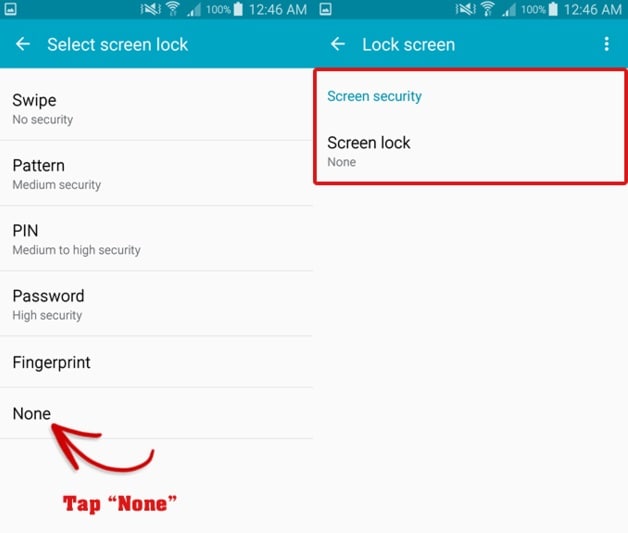
Step 4: If you have enabled your pattern choice already, it will again prompt you to enter the pattern. Once you entered the pattern, the swipe screen lock will disappear.
Step 5: The final step is to reboot your Android device to update the feature of turning off the swipe screen. Now you can open your device at any time without using the pattern lock feature.
Note: Regardless of any situation of forgetting the Android lock password, you can go for an email account set up for swiping into the Android devices.
Conclusion
Now, to sum up, we would say that in this article, we tried to bring out the best solutions for your Android device in such cases wherein you want to disable your screen security. The Dr.Fone - Screen Unlock is simply a proven mechanism that delivers what we need and that, too, without any data loss. We ensure that you can disable the swipe screen to unlock easily and effectively using the methods given above. Hence, you can access your phone by bypassing swipe lock Android even if you forget the screen lock code. So, don’t just wait, but bring out the solution for the swipe screen to unlock the Android device with Dr.Fone - Screen Unlock (Android) now.
Still Using Pattern Locks with Asus ROG Phone 8? Tips, Tricks and Helpful Advice
They have been along for a long, long time now – pattern locks – the easiest of all smartphone locks. You just swipe your finger across to create an easy pattern lock of your choosing and that’s it, it becomes your new screen lock. No more remembering tedious digits! So, why have these easy pattern locks become outdated, and why do people still continue to use them? Let’s take a dive and find out all about pattern locks.

Part I: Things To Know About Pattern Locks
The first cellphone locks were 4-digit number locks. Then came 6-digit codes, and even alphanumeric ones. Pattern locks were all the rage a while ago. Though pattern locks continue to be used, they are not considered safe to use any longer. What is all that about? Here’s what you need to know about pattern locks, whether you are a seasoned pattern lock user or not.
I.I: What Are Pattern Locks?
Believe it or not, technology has advanced at such a rapid pace in the last two decades that you’d be forgiven if you don’t know what a pattern lock is, especially if you have only ever used iPhones, or Android phones in just the last few years.
Pattern locks are patterns you create on your smartphone and designate as a smartphone lock/ screen lock. There is a 9-point keypad of sorts, and you start swiping your finger from any point to any point for any which way you feel like. Android 13 allows a minimum of 4 points registered. They are easy to create, and easy to use, hence called easy pattern locks.
Pattern locks have only ever been offered on Android devices and were commonplace a few years ago until they were deemed not secure enough for use by modern standards because they were easy to figure out by malicious actors.
I.II: Popularity and Usage
Pattern lock is a feature unique to Android and has been so since the start. Naturally, it is one of the preferred ways users have come to unlock their Android devices over the years. Even though modern Android smartphones come with fingerprint recognition and face recognition technologies, there exists a large subset of users still addicted to and acclimatized with the pattern lock feature, opting over fingerprint and face recognition.
There has been, however, research conducted into the safety and security offered by pattern lock in Android.
I.III: Advantages and Drawbacks
Modern smartphones very nearly contain the entirety of our lives; photo memories, video memories, important documents both financial and personal in nature, banking apps, ID and ATM/ credit cards in the “wallet” apps, and whatnot. A smartphone falling into the wrong hands could very nearly be used to devastate the rightful owner, both financially and otherwise. And this is not a claim out of thin air; spyware/ malware/ phishing attacks are on the rise around the world. Locking the smartphone, once considered optional and an unnecessary hassle, is now an absolute must.
Advantages of Pattern Locks
There is no denying that using an easy pattern lock to lock their smartphone seems enough for most users. Swiping your finger across your smartphone to unlock it feels not only cool and futuristic but safer and more secure than remembering and punching in digits. And, for the most part, it is true, given that 4-digit PINs can only have 10,000 unique combinations!
Disadvantages of Pattern Locks
While very easy to use, security researchers and experts have come to agree that the feature is not in the least safe to use, and that is because of how people use the pattern lock feature (discussed in detail below in part II). Some go so far as to say that most pattern locks can be breached in just 5 attempts or less. Imagine that!
What is more, research has found that humans have an uncanny ability to correctly guess a pattern lock simply by viewing the unlocking! The test comprised showing the test subjects videos of users unlocking their phones from different angles and varying distances, and it was found that around 64% of test subjects were able to correctly guess a 6-point pattern lock in one viewing only, and 80% could correctly guess the pattern after just two viewings. By contrast, only 11% were able to correctly deduce a 6-digit PIN after one viewing, and only 27% after viewing twice. This goes to show just how insecure pattern locks are!
Part II: How People Use Pattern Locks
We might wonder how anyone would be able to guess the correct pattern of our device, but believe it or not, it is possible, eerily easily at that! We are all the same humans, after all! You know how people usually set PINs that could be significant dates in their lives? How they get car registration numbers that mean something to them? The same ‘logic’ applies to their setting pattern locks.
At DEFCON 23, Marte Loge, an M.Sc. Computer Science student, presented something that stunned people around the world. She said, “Tell me who you are, and I will tell you your lock pattern.” What followed was an expert presentation outlining and detailing user behaviors around pattern locks.
These are some commonly created pattern locks by people:
- - shapes of alphabets,
- - shapes of numerals,
- - any other easy-to-make, simple shape.
Marte Loge presented the image below, showing how people naturally gravitate towards creating simple shape patterns, in her research.

To further help you see how easy it might be for anyone to guess your pattern, Marte Loge also presented some statistics.
- - 77% of people started their patterns in one of the 4 corners.
- - 44% of Loge’s subjects started their pattern with the first dot, the top-left one. The next number was 15% for the top-right and 14% for the bottom-left.
- - These percentages did not vary much depending on left-handedness or right-handedness.
- - On average, irrespective of gender, people set 5-point patterns, with 4-point patterns being the most common. This means that the number of combinations on average was 7152 for 5-point patterns and a bogglingly low 1624 for 4-point patterns.
The above data makes it amply clear how using an easy pattern lock is actually worse than using a 4-digit PIN, simply because how people are usually using the pattern lock feature.
Part III: Tips For Using More Secure Pattern Locks
Now, we know how hard it is to break habits cemented over years of use, so in case you must at all costs use a pattern lock only, the least you can do is try and change your easy pattern lock to a better, more secure hard pattern lock.
III.I: How to Create More Secure Patterns
Here are some tips to help you create a better, more secure pattern lock for your smartphone.
- - Avoid using any of the corners to start the pattern.
- - Never use your first initial as a pattern.
- - Never use a digit shape as a pattern.
- - You can pass through the same pattern lines multiple times over. This makes it more difficult for someone to guess your pattern correctly.
- - Use all 9 points on the grid while setting the pattern lock! That simple act takes the possible pattern combinations to over 140,000, significantly more than 10,000 for 4-digit PINs, and vastly superior to paltry 1624 for a 4-point easy pattern lock!
III.II: Forgot Your Pattern? Unlock Your Asus ROG Phone 8 Without Pattern Lock With Dr.Fone
Supercharged with the information above, you went ahead and changed your easy pattern lock to a hard-to-guess pattern lock. Only problem is, your brain is habituated to that old pattern, and you’ve suddenly forgotten what the new pattern was! Well, worry not; Wondershare Dr.Fone - Screen Unlock (Android) will help you unlock your phone without pattern lock !

Dr.Fone - Screen Unlock (Android)
The Best Tool to Unlock Your Asus ROG Phone 8 without Pattern Locks!
- Remove all Android screen locks (PIN/pattern/fingerprints/face ID) in minutes.
- Bypass the FRP lock of Samsung without a PIN or Google account.
- Everyone can handle the lock screen without any tech knowledge.
- Provide specific removal solutions to promise good success rate.
4,008,669 people have downloaded it
Download the newest version of Dr.Fone from the Wondershare website and launch the app.

Step 1: Go to Toolbox > Screen Unlock and click Android.
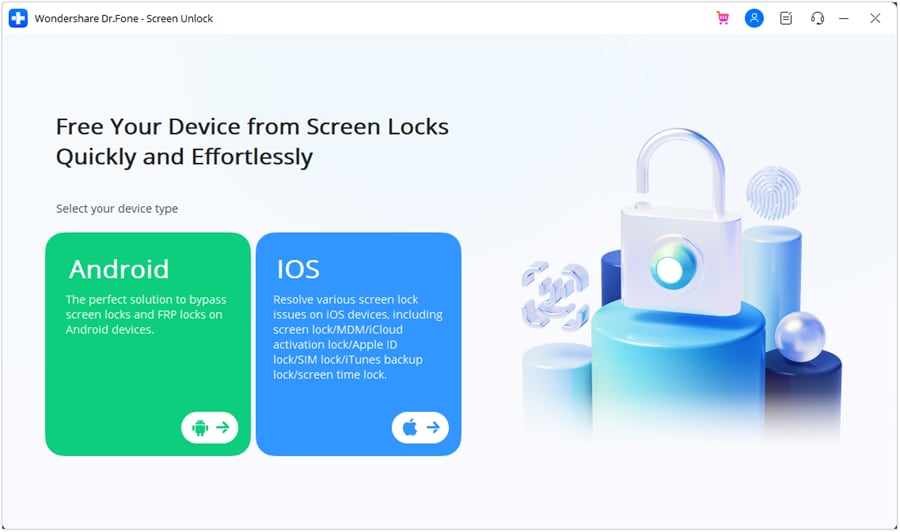
Step 2: Click Unlock Android Screen.

Step 3: You will see a list of supported manufacturers on the next screen. Select yours.

Step 4: Now, follow the onscreen guide to prepare your device for screen unlocking.
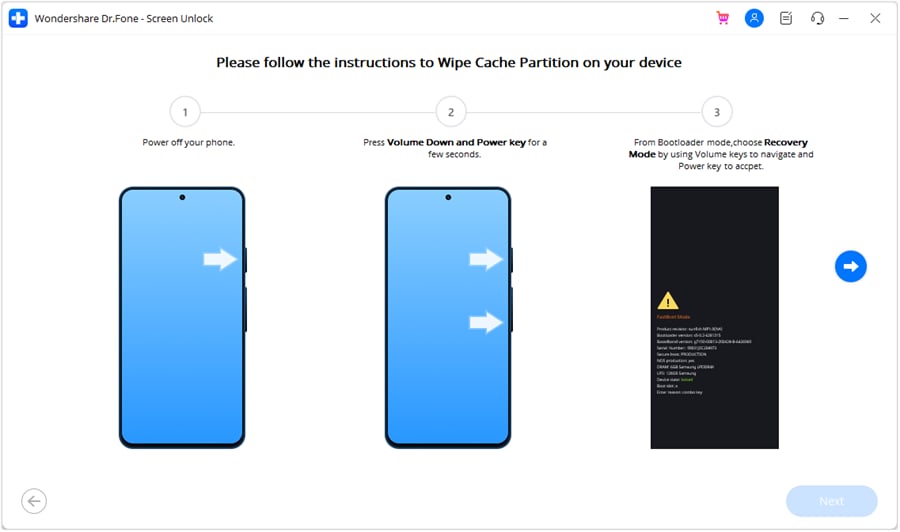
After completing the process, when the Next button becomes available, click it.
Your device will be successfully unlocked.

Note that this method wipes all data on the Asus ROG Phone 8 device. There is no way around it. You may be able to unlock select older Samsung devices without data loss. Check this list for those devices.
Closing Words
Pattern locks are outdated and not safe to use an easy pattern lock – there are no two ways about it. As such, our recommendation is to start using a 6-digit PIN along with biometric or face recognition. However, we do understand that sometimes, you simply cannot use biometrics or face recognition. For those instances, we recommend that you use this guide and create a more secure pattern lock for your device. In case you forgot your pattern, there is always Wondershare Dr.Fone – Screen Unlock (Android) to save the day.
A Perfect Guide To Remove or Disable Google Smart Lock On Asus ROG Phone 8
Google services are pivotal in enhancing user experience and securing personal data. Among these services, Google Smart Lock stands out for its ingenious features. These are integrated into Android devices, simplifying access and bolstering security. However, there are instances where users seek to disable or remove Google Smart Lock.
This article goes through the details of Google Smart Lock and its significance. It offers a solution to address unexpected screen lock scenarios on Android devices.
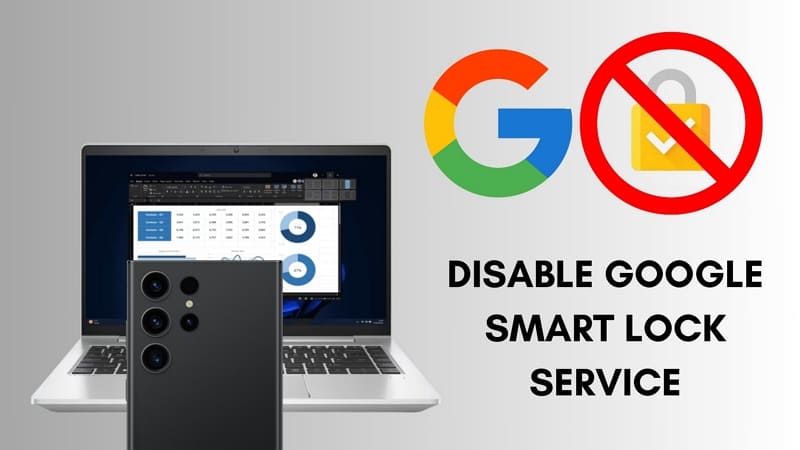
Part 1. Understanding Google Smart Lock and How It Works?
Want to know what is Google Smart Lock? Google Smart Lock serves as a multi-purpose tool within the Google ecosystem. It is designed to streamline security measures and password management access across platforms. At its core, Google Smart Lock operates as a feature that manages passwords. Google Smart Lock aims to enhance authentication processes. Primarily, it operates across Android devices and computers.
It offers a unified approach to security, ensuring you don’t have to remember all the passwords. Google Smart Lock securely stores and manages passwords for websites and apps. It enables users to access these services without repeatedly entering login details. When you visit a familiar website or app, Google Smart Lock fills in the login credentials. It automatically provides the login ID and password, maintaining effortless access.
Part 2. Recognizing Some Top Features of Google Smart Lock
Google Smart Lock’s password management has revolutionized how users handle and secure their login credentials. It remains a cornerstone when handling Android devices and computer systems. The following are several notable features that significantly enhance user convenience and security:
1. Password Autofill
Google Smart Lock simplifies the login process across apps and websites. It does that by automatically filling in saved credentials. This eliminates the need for users to remember and manually input passwords.
2. Cross-Platform Synchronization
It synchronizes saved passwords across multiple devices using the same Google account. This ensures smooth access to credentials on Android devices and computers.
3. Secure Storage
Passwords stored within Google Smart Lock are encrypted and securely stored in the user’s Google account. This maintains confidentiality and safeguards sensitive login information.
4. Effortless Password Generation
It allows the creation of strong and unique passwords when signing up for new accounts. That enhances overall account security and allows users to have strong passwords.
These features significantly ease the burden of password management and enhance user security. Yet, Google Smart Lock does have limitations that prompt some users to consider removing it.
Part 3. Why Is It Essential To Remove Google Smart Lock?
Despite its array of benefits, there are times when users consider removing or disabling Google Smart Lock. Described below are these limitations to better grasp why users might choose to Google Smart Lock turn off:
1. Privacy Concerns
Some users focus on privacy and feel uncomfortable with Google Smart Lock’s access to their passwords. The reason behind this is how easily anyone can access the saved password. All they need to do is access “Manage Passwords” in Google Chrome, and all their passwords will be open. This leads them to opt for more private password management options.
2. Glitches and Technical Issues
Technical glitches in the functioning of Google Smart Lock can be frustrating. This is especially prominent when managing passwords with similar usernames across different websites. The same can happen when using similar passwords for different websites or apps. Users experiencing such issues can seek to remove it to restore regular operations.
3. No Updates
You should be aware that Google Smart Lock for Passwords has been deprecated. This indicates it no longer receives updates or support from Google. Developers are advised to opt for Google’s One Tap Sign-in feature as an alternative by Google. It provides a more efficient and secure method for signing in to apps and websites.
4. Preference for Third-Party Tools
Certain users might have a preference for specialized third-party password management tools. They can go for solutions that offer a wider array of features. Many users might want to find options better aligned with their specific needs. This prompts them to disable Google Smart Lock.
Part 4. Understanding Some Effective Ways To Disable or Remove Google Smart Lock
If you want to disable Google Smart Lock on your devices, it is a relatively easy thing to do. Several ways are available to disable or remove Google Smart Lock from devices. These approaches cater to users’ diverse needs and preferences. Here is how to turn off Google Smart Lock:
Way 1. Disabling Google Smart Lock on Your Android
To deactivate Google Smart Lock on your Android device, you can use Chrome. Google Chrome is the main hub for storing all your login credentials for websites and apps. This provides the quickest way to disable Google Smart Lock. To disable Google Smart Lock from the Chrome app on your Android device, follow these steps:
- Step 1. Begin by opening the Google Chrome app on your Android device. Then, tap the “three dots” icon from the top right corner and press “Settings.”

- Step 2. Within the Settings, choose “Passwords,” and on the following screen, look for the “Save passwords” and “Auto Sign-in” options. Toggle off both options to disable the Google Smart Lock feature from your Android.

Way 2. Removing Google Smart Lock From Android Settings
Google Smart Lock enables users to keep their phones unlocked under specific, pre-approved, and secure conditions. This simplifies device usage by eliminating the need to input passwords or security codes. The basic working of this aspect of Google Smart Lock, now known as “Extend Unlock,” is divided into three parts.
The first one is on-body detection, which keeps the Asus ROG Phone 8 device unlocked when it’s carried or held by the user. The other two are “Trusted Places” and “Trusted Devices.” Users can set specific locations, like home or work, as “Trusted Places.” When the Asus ROG Phone 8 device is within these locations, it remains unlocked and accessible. Smart Lock integrates biometric authentication methods to unlock devices.
As helpful as it is in managing access to your Android device, privacy concerns can cause users to disable this lock. The following are the steps you can take to disable Google Smart Lock/Extend Unlock via Android settings:
- Step 1. Access “Settings” on your Android device and scroll down to tap “Passwords & security.” Here, press the option labeled as “Privacy.”
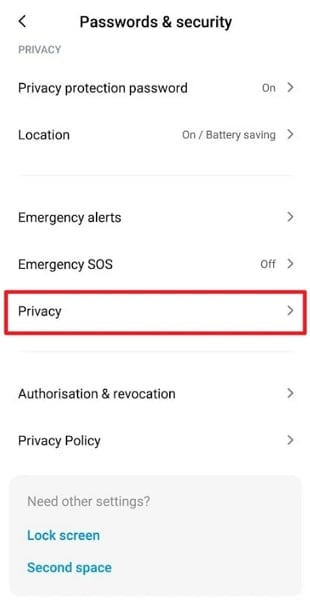
- Step 2. On the following screen, head to the “Trust agents” option and toggle off the “Smart Lock (Google)” option to disable the feature on your device.

Way 3. Disabling Google Smart Lock From Chrome
While you can manage this feature on Android devices, it is also available on Google Chrome on your computer. To disable Google Smart Lock from Google Chrome on your computer or laptop, you can follow these steps:
- Step 1. On your computer, access Google Chrome and click the “three dots” near the top right corner. From the context menu, choose “Settings” and tap “Autofill and passwords” from the left side.

- Step 2. Now, click “Google Password Manager” on the ensuing window, and choose “Settings” from the left side. Toggle off “Offer to save passwords” and “Sign in automatically” to disable Google Smart Lock.

Part 5. Forgot Google Smart Lock From Android Device? Recover Using Wondershare Dr.Fone
Disabling the Google Smart Lock can have a side effect, which is the danger of forgetting an important password. One of these important passwords is the screen lock on your Android device. These scenarios could involve forgetting the Asus ROG Phone 8 device’s PIN, pattern, or password. This could be essential for unlocking the phone or accessing its functionalities. It can lead to being locked out of the Asus ROG Phone 8 device, hindering normal operations.
In such instances, regaining access becomes crucial. Wondershare Dr.Fone offers a robust solution in these cases. This software specializes in unlocking Android devices when users forget their device passcodes. It offers a swift solution to eliminate Android lock screens within 5 minutes. If you own a Samsung or LG device, you can unlock it without data loss.
Notable Features of Wondershare Dr.Fone
- This tool bypasses the Android FRP lock without necessitating a PIN or Google account.
- It broadens its ability to unlock well-known Android brands like Samsung, Huawei, and LG.
- Additionally, its intuitive interface guarantees that no technical know-how is required.
Step-by-Step Guide To Unlock Android Smartphone via Wondershare Dr.Fone
Dr.Fone makes the process of unlocking an Android device a breeze. Here’s a step-by-step guide to recover an Android device using Wondershare Dr.Fone:
- Step 1. Unlocking an Android Device Using Wondershare Dr.Fone
To begin, install the most recent edition of Wondershare Dr.Fone and connect your Android device using a USB cable. Access the “Toolbox” menu and locate the “Screen Unlock” tool upon successful connection. Once opened, choose the “Android” option when prompted. Next, select “Unlock Android Screen” from the available options.

- Step 2. Device Brand Selection and Screen Unlock Initiation
Select your device brand and “100% Remove Screen Lock.” Selecting the Asus ROG Phone 8 device brand initiates access to the designated mode. It will trigger Dr.Fone to commence unlocking the Android screen. Note that entering specific modes varies depending on the Asus ROG Phone 8 device brand. Upon successfully unlocking your Android device screen, tap “Done.”
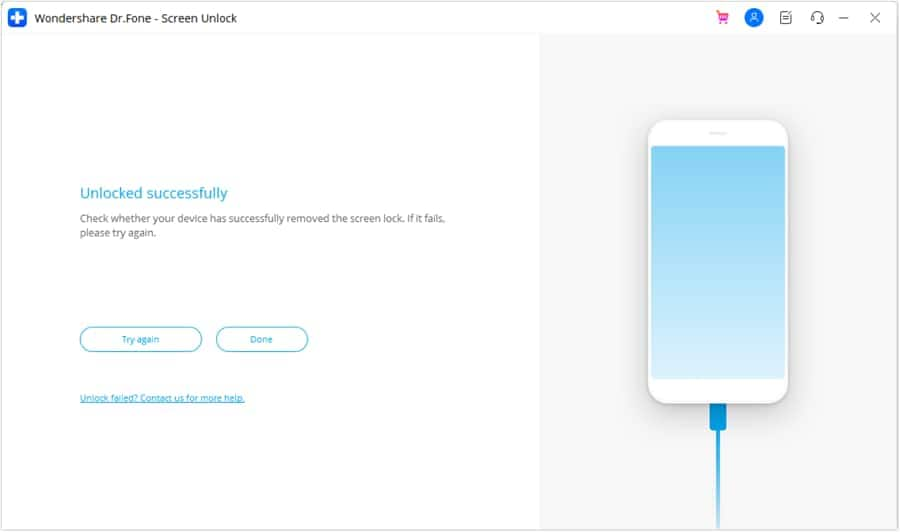
Tips: Forget your device password and can’t get access to it? No worries as Dr.Fone is here to help you. Download it and start a seamless unlock experience!
Conclusion
This comprehensive guide describes the significance of Google Smart Lock. It explains its features and various methods to disable it from Android devices and Chrome. Exploring scenarios of forgotten passcodes highlighted the critical need for a reliable solution. Wondershare Dr.Fone emerges as a savior in such situations. It offers a secure means to regain access when locked out of your device.
Also read:
- [New] 2023'S Leading Browsers Recording Software Guide for 2024
- [New] Achieving Professional Colors with Central Luts for 2024
- [New] In 2024, Lightning Lens Work Efficiently Producing Google Collage Shots
- [New] Masterful Art in a Flash Quick Draw on Windows 10 Images
- [New] Pinterest Video Extraction Top 5 Free Tools Ranked
- [Updated] In 2024, Crafting a Standout Solo Podcast Experience
- [Updated] Shot Solidity Choose the Right Mobile Tripod
- 10 Easy-to-Use FRP Bypass Tools for Unlocking Google Accounts On Motorola
- Exploring Private Settings in Meta and Facebook's Rift 2 Ecosystem
- Get Your RS-232 USB Driver ASAP – Swift Installation Guide
- Guida Rapida Al Trasferimento Di File Nelle Diverse Versioni Di Windows, Dalla Modalità Provvisoria
- How to Reset Gmail Password on Motorola Devices
- How to Unlock Samsung Galaxy M54 5G Phone without Google Account?
- In 2024, Forgot Pattern Lock? Heres How You Can Unlock Vivo Y78 5G Pattern Lock Screen
- In 2024, How to Reset Gmail Password on Samsung Galaxy F34 5G Devices
- In 2024, How to Unlock Vivo V27 Phone with Broken Screen
- In 2024, Pattern Locks Are Unsafe Secure Your Vivo V27e Phone Now with These Tips
- In 2024, Universal Unlock Pattern for Vivo Y27 5G
- In 2024, Unlock Samsung Galaxy M14 4G Phone Password Without Factory Reset Full Guide Here
- Title: In 2024, The Ultimate Guide How to Bypass Swipe Screen to Unlock on Asus ROG Phone 8 Device
- Author: Peter
- Created at : 2024-11-18 19:05:38
- Updated at : 2024-11-25 21:07:48
- Link: https://android-unlock.techidaily.com/in-2024-the-ultimate-guide-how-to-bypass-swipe-screen-to-unlock-on-asus-rog-phone-8-device-by-drfone-android/
- License: This work is licensed under CC BY-NC-SA 4.0.